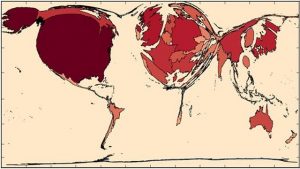Racism and homophobia are real conditions of all our lives in this place and time. I urge each one of us here to reach down into that deep place of knowledge inside herself and touch that terror and loathing of any difference that lives there. See whose face it wears. Then the personal as the political can begin to illuminate our choices.
(Audre Lorde, ‘The Masters’s tools Will Never Dismantle the Masters’s House’, 1984, Sister Outsider: Essays and Speeches. Ed. Berkeley, CA: Crossing Press. 110-114. 2007)
Women of the Brown Atlantic (WOBA) came to a halt in March 2020, when the novel coronavirus (COVID 19) was declared a global pandemic. The restrictions implemented meant that our 10th March invited talk dedicated to Maria Firmina dos Reis had to be cancelled and postponed. The same happened to a workshop we were organising, titled “Oficina da Memória: histórias de memória e mobilidade no Atlântico Pardo”. Soon after, in May 2020, I gave birth to Benjamim and started a period of maternity leave that finished a year later.
The redefinition of family and social dynamics resulting from childbirth and the pandemic meant that the WOBA project and its blog lay dormant for months. During this time, I discovered a room at the back of my mind where I often sat looking at the project, as one looks at a baby asleep to see if it’s breathing. Conversations with collaborators such as Shenia Karlsson and Rosane Carneiro Ramos also played a role in this process of peering, as well as books read here and there. One of them, Plantation Memories by Grada Kilomba, had a particularly disquieting effect. In it I read something that made me shuffle in my seat: ‘Em geral, mulheres brancas são extraordinariamente relutantes em enxergarem-se como opressoras’ (p. 102). Despite the rigorous ethical processes integrated in the practices of WOBA, this triggered a number of questions. How many of this project’s concerns – black maternity, memory and mobility – are a reflection of my own preference for dominant feminist paradigms that emphasise gender over race, even when race is on the equation? How much of this project’s methodology derives from the traditional academic viewpoint that historically privileges research stemming from emotional, social and political distancing? How hierarchical is my practice, my way of thinking, my writing? How (in)adequate? Have I memorised colonialism so well that it resurfaces in my research? Most importantly, can all of this be undone? Is it even possible? Does anyone have a map of the lost land of pre-colonial scholarship?
It is with these unsettling questions, for now left without answers, that I gently bring WOBA back to life, and prepare, once more, to reignite collaborative research and conduct partnerships across the Atlantic is an egalitarian manner. For me, a white European woman researching gender and blackness, it is paramount to continue this imperfect enterprise by at least noting my interest in these questions, even when – especially when – these questions threaten to undo my entire critique.
Welcome back, WOBA.

